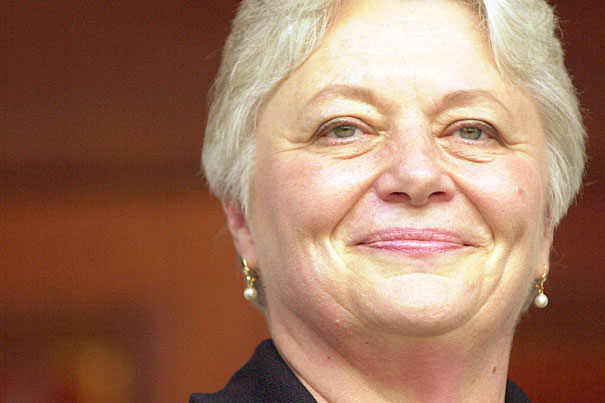
“I am deeply grateful to Nancy for her leadership and her exemplary service to Harvard,” said Faculty of Arts and Sciences Dean Michael D. Smith. “The new vision for the Harvard Library we are now embracing, and the profound and positive changes this vision will bring, are an important part of her legacy, in keeping with the many advances she has forwarded over her long career here.”
File photo by Kris Snibbe/Harvard Staff Photographer
Harvard College Librarian, Nancy Cline, to retire
After nearly 15 years of exceptional service, Nancy M. Cline, the Roy E. Larsen Librarian of Harvard College, will retire at the end of this academic year.
Cline’s long career at Harvard is distinguished by many notable accomplishments. In 1996, she began her current appointment overseeing the operations of the major libraries and units within the Harvard College Library. During her tenure at Harvard, Widener Library has been completely renovated; support for collections preservation has increased; and Harvard’s Library Digital Initiative has been launched.
Outside of Harvard, Cline is regarded as a national leader in the library profession and currently serves on the MIT Corporation Visiting Committee for the Libraries, the University of Miami Libraries Visiting Committee, and the Cambridge University Board of Electors to the Librarianship. She is also a member of the ITHAKA Board of Trustees. She has spoken and published on numerous topics including digital libraries, intellectual property, preservation, security, and library administration.
In 2006, Cline received the Hugh C. Atkinson Memorial Award, which recognizes an academic librarian who has made significant contributions in the area of library automation or management and has made notable improvements in library services or research.
“I am deeply grateful to Nancy for her leadership and her exemplary service to Harvard,” said Faculty of Arts and Sciences (FAS) Dean Michael D. Smith. “The new vision for the Harvard Library we are now embracing, and the profound and positive changes this vision will bring, are an important part of her legacy, in keeping with the many advances she has forwarded over her long career here. Her contributions to FAS and the University will endure for generations to come, affecting us all for the better.”




